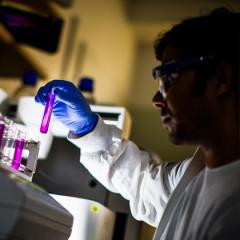What do 4D printed robots, fish food, flow batteries, PFAS remediation, next-gen mRNA, and indoor solar panels have in common?
They’re all AIBN-led projects sharing almost $5 million in funding in the latest round of ARC Fellowships, Mid-Career Industry Fellowships, and Early Career Industry Fellowships.
The scope of the funded projects highlights the AIBN's range of capabilities across personalised medicine, advanced biomanufacturing, and nanoengineered materials.
Next generation mRNA synthesis
Making mRNA is a global priority, especially with its growing role in vaccines and new medicines. While recent advances have helped scale up mRNA production, the current methods still have some challenges, namely, the mRNA being produced has low stability and poor delivery performance.

Building on the existing mRNA expertise of the BASE Facility - Australia's leading mRNA provider - Associate Professor Seth Cheetham, Deputy Director of the facility, received a $1,131,800 Future Fellowship for a project where he will be developing a new class of ultra-stable “cloaked” mRNAs (cmRNAs). This synthetic strategy has the potential to transform the manufacture of mRNAs, increasing performance, stability and decreasing costs.
4D printed smart robotics
Advanced manufacturing and materials technology is undergoing a fourth industrial revolution, driven by digital tools like AI and robotics, with 3D printing playing a key role. Through 3D printing, we can now create soft, advanced materials for use in devices such as medical implants, soft robots, and wearable health tech.
However, improvements need to be made to the materials; developing materials that are both strong and flexible while maintaining complex shapes remains a significant challenge.

Work being undertaken by Dr Ruirui Qiao received a $1,130,976 Future Fellowship to use cutting-edge 3D and 4D printing technologies for the development of smart hydrogel-based robotic devices with programmable movements. By integrating liquid metal particles into hydrogel networks, she aims to significantly enhance the mechanical properties of the materials.
Join The Network
Stay on top of our industry news and developments, events and opportunities, by joining The Network
Sign up todayBuilding better flow batteries
Redox flow batteries are cheaper to make, safer and more adaptable than lithium batteries, making them better suited for scaling up to industrial-sized energy storage applications.
As a reliable and resilient energy storage solution, flow batteries enable power without having to rely on fuel-powered backup generators. They also have the potential for more daily hours of usage than other battery options. However, to make flow batteries a reliable energy storage option we need better battery materials.

To that end, Associate Professor Bin Luo received a $1,091,800 Mid-Career Industry Fellowship working with Northernjoin Industrial to develop innovative composite bipolar plates for all-iron redox flow batteries. The research will explore sustainable, cost-effective materials such as biomass carbon and recycled plastics, and new manufacturing methods to enhance battery performance and durability.
Creating sustainable fish food
Australia urgently needs innovative decarbonisation solutions to achieve its net zero emissions targets. Gas fermentation, which uses microorganisms to convert greenhouse gases into useful products, offers a sustainable solution for industries transitioning to net zero.

Professor Esteban Marcellin, Director of the UQ Biosustainabilty Hub, received a $1,091,800 Mid-Career Industry Fellowship to work with industry partner Woodside Energy to convert methane and CO2 into a complete fish meal replacement. The process provides bioconversion technologies for the gas industry and helps Australia transition to a strong bioeconomy.
Removing PFAS from complex water sources
PFAS, included in the group termed "forever chemicals", are used in clothing, firefighting and kitchen cookware. Due to the stability of their chemical bonds, they take a long time to break down in the environment and our bodies, making them a tough, toxic problem.

Dr Cheng Zhang, who has already successfully developed a magnetic method to clean PFAS-contaminated water, received a $947,004 Mid-Career Industry Fellowship to work with The Chemours Company and Queensland Water Directorate to improve the magnetic technology capable of removing PFAS from complex water sources such as leachates, biosolids, and industrial wastewater.
Reducing e-waste through indoor solar panels
Electronic devices, from smart electronics to the Internet-of-Things (IoT) network of sensors, dominate modern life. The majority of these devices run on batteries which contribute to electronic waste.
Dr Peng Chen received an Early Career Industry Fellowship to the tune of $506,206 to develop eco-friendly solar panels that can be used indoors, small enough that they enable battery-free solutions for modern devices. Peng will team up with industry partner Halocell Energy to help translate the prototypes into commercial products.

This project could help stimulate Australia’s economic growth by creating new solar cell products and positioning Australia as a leader in flexible electronics and renewable energies.
From clean energy to next-gen medicine, these fellowships reflect AIBN’s passion for tackling global challenges through science that solves serious problems. Congratulations to all the fellowship recipients!
Want to learn more about this story or how you can partner with AIBN on ground-breaking research?
Contact us via email: communications@aibn.uq.edu.au
or phone: +61 414 984 324


